As the year 2020 comes to a close, we look back at some of the most disturbing crime stories from around the world that received significant media coverage and left many appalled.
Here's the round-up:
1. Philippine rogue cop
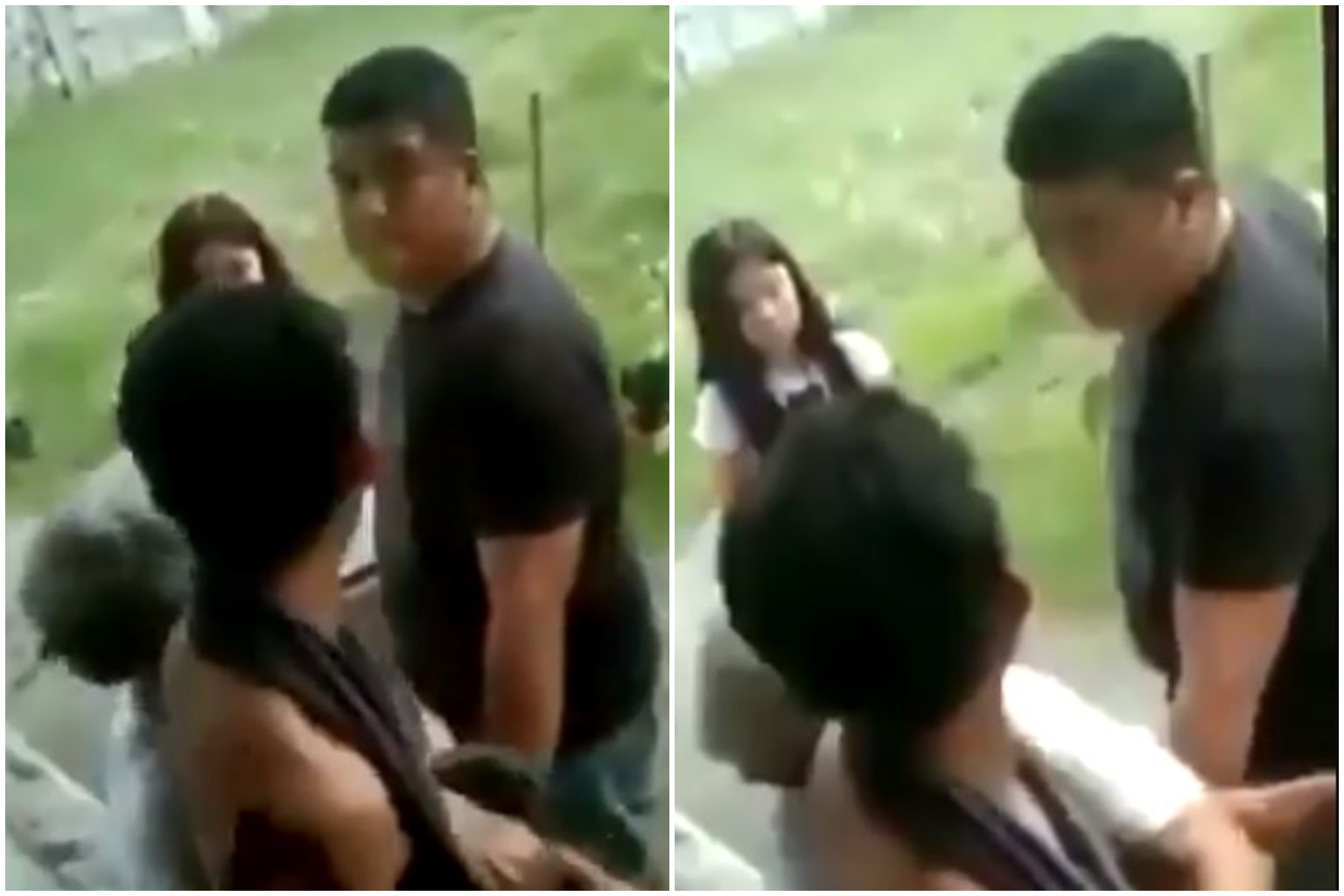
Filipinos woke up on Dec 21 morning to a harrowing five-minute video of an off-duty police officer shooting point blank at a neighbour and her son in broad daylight in front of a small crowd.
The video showed Mrs Sonya Gregorio, 52, with her arms wrapped tightly around her son, Mr Frank Anthony Gregorio, 25, as they were confronted by Sergeant Jonel Nuezca, 46, just outside her house in Paniqui town, Tarlac province, 230km north of the capital Manila.
Police reports said the scuffle began after Mr Gregorio set off an air cannon made out of a PVC pipe, creating a loud noise.
The situation deteriorated into a heated argument over a land dispute. Throughout the incident, Mrs Gregorio had her arms wrapped around her son to prevent Nuezca from arresting him.
As dozens of bystanders - including his young daughter - watched, Nuezca pulled out his 9mm pistol and shot Mrs Gregorio in the head. He then shot Mr Gregorio, also in the head. Just before Nuezca fled the scene, he again shot Mrs Gregorio in the head as she was sprawled on the ground.
Nuezca surrendered hours later and has been charged with two counts of murder.
The brutal murders provoked a wave of outrage directed at the government and cast a harsh light on perceived abuses by policemen purportedly emboldened by President Rodrigo Duterte, who is accused of mollycoddling officers carrying out his bloody drug war.
Mr Duterte condemned the shooting and warned "there will be hell to pay" for rogue officers.
2. Murder of Indonesian Christian family
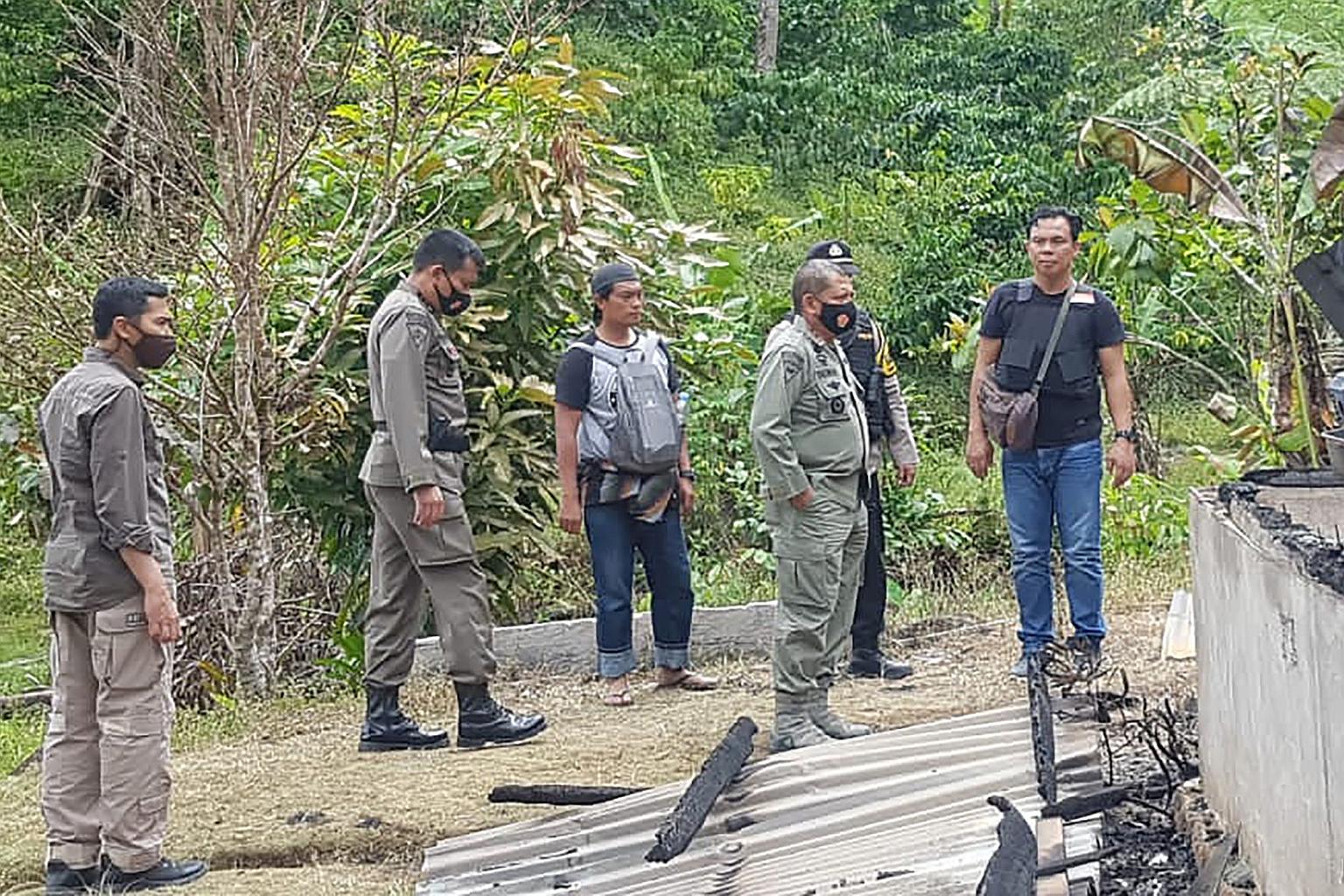
A group of sword-and-gun-wielding attackers ambushed the Lemban Tongoa village in Indonesia's Central Sulawesi province in the morning of Nov 28, killing four members of a Christian family and torching several homes, including one used for regular prayers and services.
Two of the victims were beheaded.
Police said they believed the extremist Eastern Indonesia Mujahideen (MIT) group, which had pledged allegiance to the Islamic State in Iraq and Syria (ISIS), was responsible for the attack.
Less than a week later, police revealed it was hunting down 11 male suspects who had split up to avoid detection as they were cornered.
A senior field military officer said they had descended from the higher mountain areas and were near the borders of Poso and Sigi regencies in Central Sulawesi.
"We used to do our tracking work relying on IT (information technology), but today they do not use a single mobile phone," said the officer based in Poso, who spoke on condition of anonymity. "That incident is a blow to us."
The Muslim-majority country, has long wrestled with Islamist militancy and terror attacks, while Central Sulawesi has seen intermittent violence between Christians and Muslims for decades.
3. Gang rape of India's Dalit woman
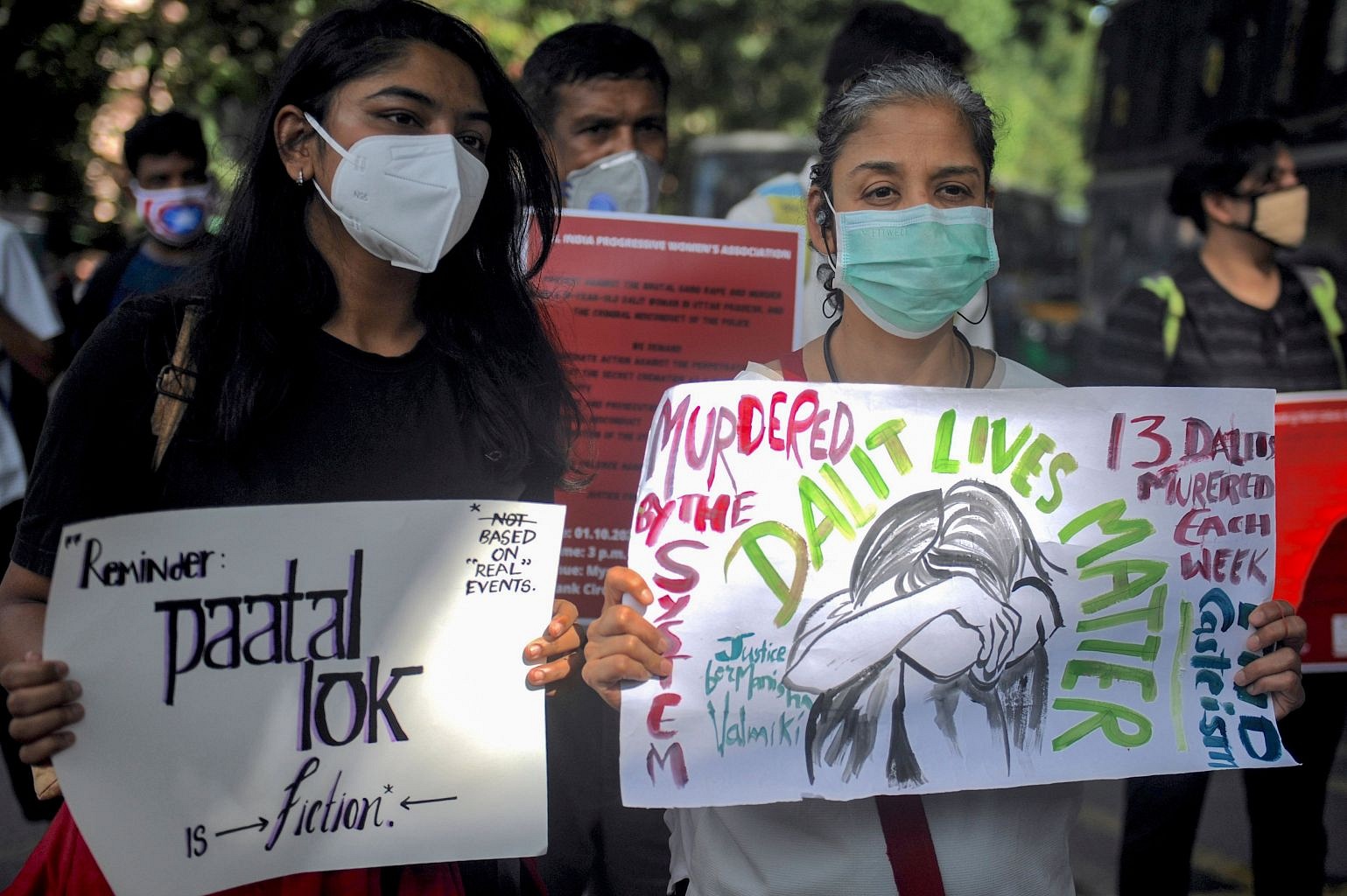
A 19-year-old woman from India's marginalised Dalit community was left paralysed after a brutal attack on Sept 14 in a field outside a village in the northern state of Uttar Pradesh.
She was found lying in a pool of blood after going missing while collecting fodder outside her home village of Bool Gahri in the Hathras district.
An officer said her tongue was cut off while her attackers attempted to strangulate her.
A hospital spokesman said the victim was not able to breathe properly and was paralysed in all four limbs as her spinal cord was damaged.
The woman, who cannot be named for legal reasons, was later taken to hospital in New Delhi, around 200km away, but died from her injuries two weeks later.
The attack sparked anger that was further fuelled after the woman's family accused police of cremating her body in the dead of night - against their wishes and religious custom - raising doubts about their commitment to a proper investigation.
Uttar Pradesh police chief Vikrant Vir insisted the woman's cremation took place with the family's consent, but added: "We did not want any outsider to create law and order disturbances."
Several senior police officers, including Mr Vir, have since been suspended over the investigation.
Four suspects, who all belonged to a higher caste, were charged in December with rape and murder.
Days after the death of the 19-year-old, another Dalit woman, 22, died after being gang raped in Balrampur district, around 500km away from Hathras.
4. South Korean online sex abuse ring
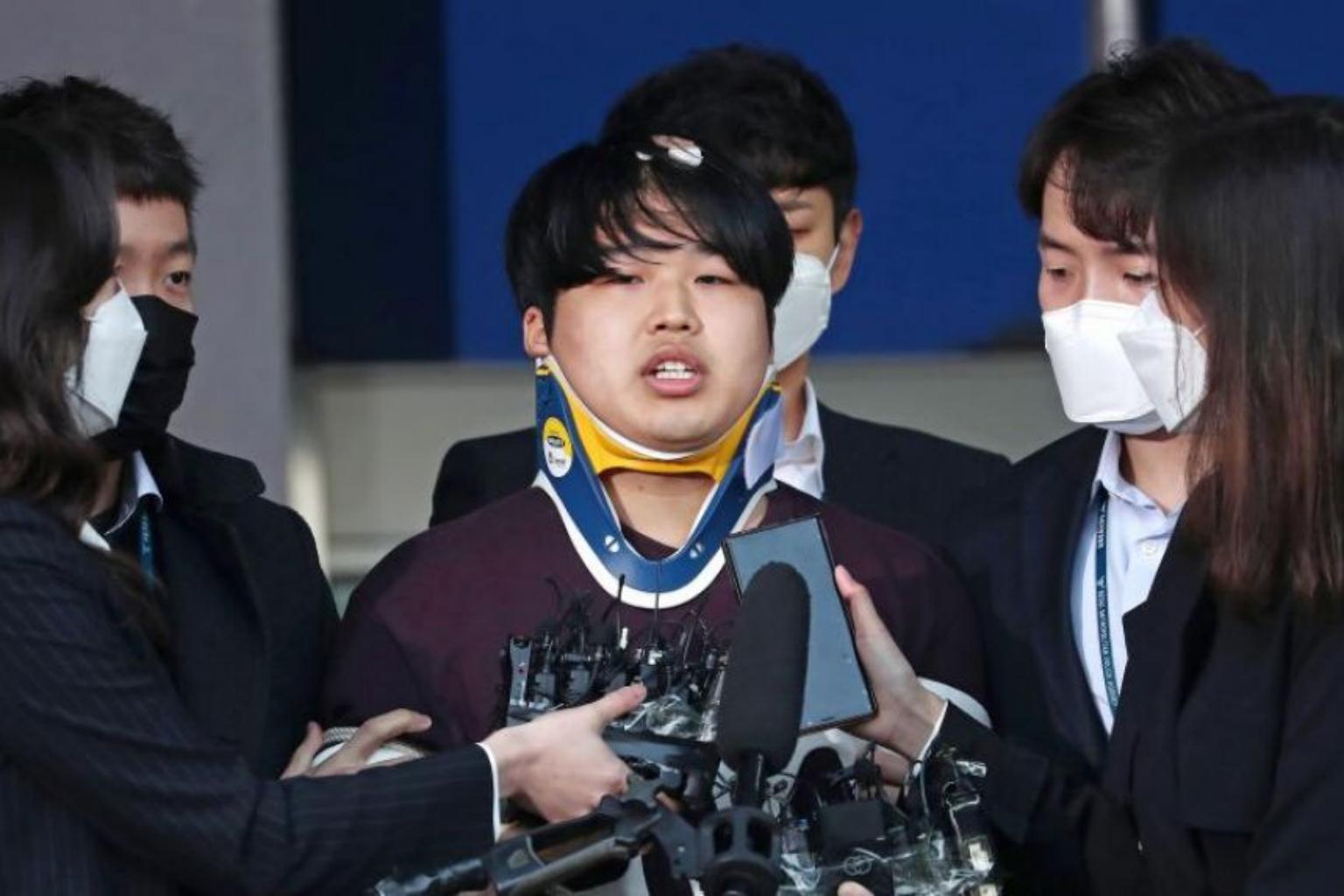
A regular volunteer at an orphanage in South Korea was arrested in March for sexually abusing 74 women, including 16 who were underage, in order to run a series of sex chat rooms on the Telegram instant messaging app.
The fiendish act of Cho Ju-bin, 24, earned him hundreds of millions of won in cryptocurrency from a subscriber list of up to 260,000 people.
In what was described as "virtual slavery", he allegedly lured and blackmailed the women into sending obscenely brutal images and videos of themselves, then posted them in chat rooms that charged participants as much as 1.5 million won (S$1,760) for viewing.
The case sparked a national outcry, with millions of Koreans signing petitions urging the authorities to name and publicly shame Cho and the subscribers of his so-called "Nth room" chat groups.
Cho was paraded in public after his capture in a rare move by the police. Standing outside Jongno Police Station in central Seoul, Cho apologised and thanked the authorities "for ending my unstoppable life as a devil".
The leader of the online sex blackmail ring was sentenced to 40 years in prison in November.
5. Death of American black man George Floyd
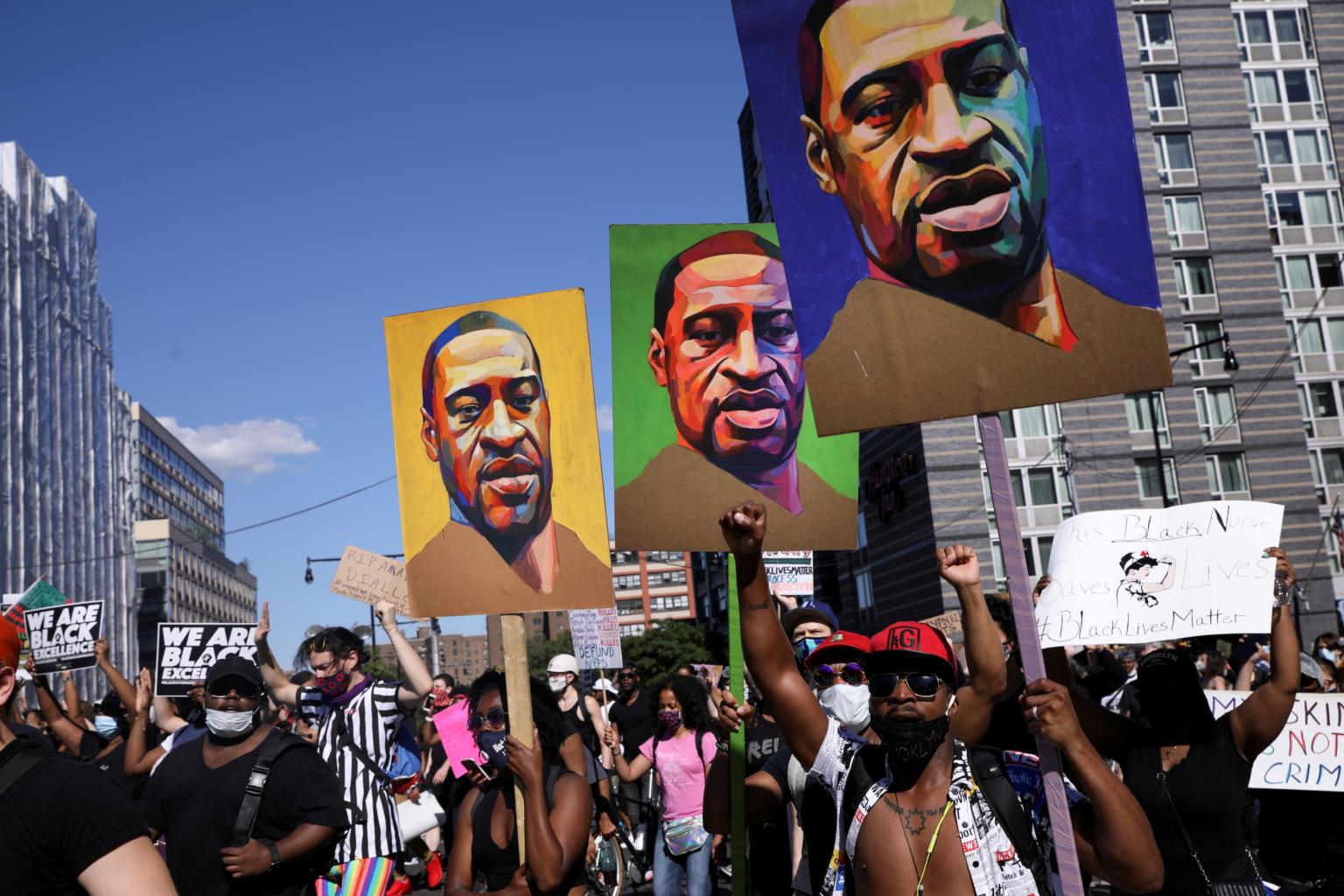
A video of a handcuffed black man dying while a Minneapolis officer knelt on his neck for more than five minutes sparked a furore in the United States over police treatment of African Americans.
The widely circulated video of Mr Floyd's fatal encounter on May 25 with the police, taken by a bystander, showed him lying face down and handcuffed, groaning for help and repeatedly saying, "please, I can't breathe," before becoming motionless.
Mr Floyd who was unarmed and reportedly suspected of trying to pass a US$20 counterfeit bill at a corner eatery, was taken by ambulance from the scene of his arrest and pronounced dead the same night at a hospital.
The death of Mr Floyd, along with other victims of racial injustice and police brutality, renewed the momentum of the Black Lives Matter movement and ignited protests across the globe.
Four former Minneapolis officers were charged in the killing of the father of a six-year-old girl.
Derek Chauvin, the man who pressed his knee against Mr Floyd's neck, was charged with second-degree unintentional murder and second-degree manslaughter. A third-degree murder charge was dropped.
Thomas Lane, J Kueng and Tou Thao were charged with aiding and abetting second-degree murder and aiding and abetting manslaughter.
6. Chinese vlogger set on fire
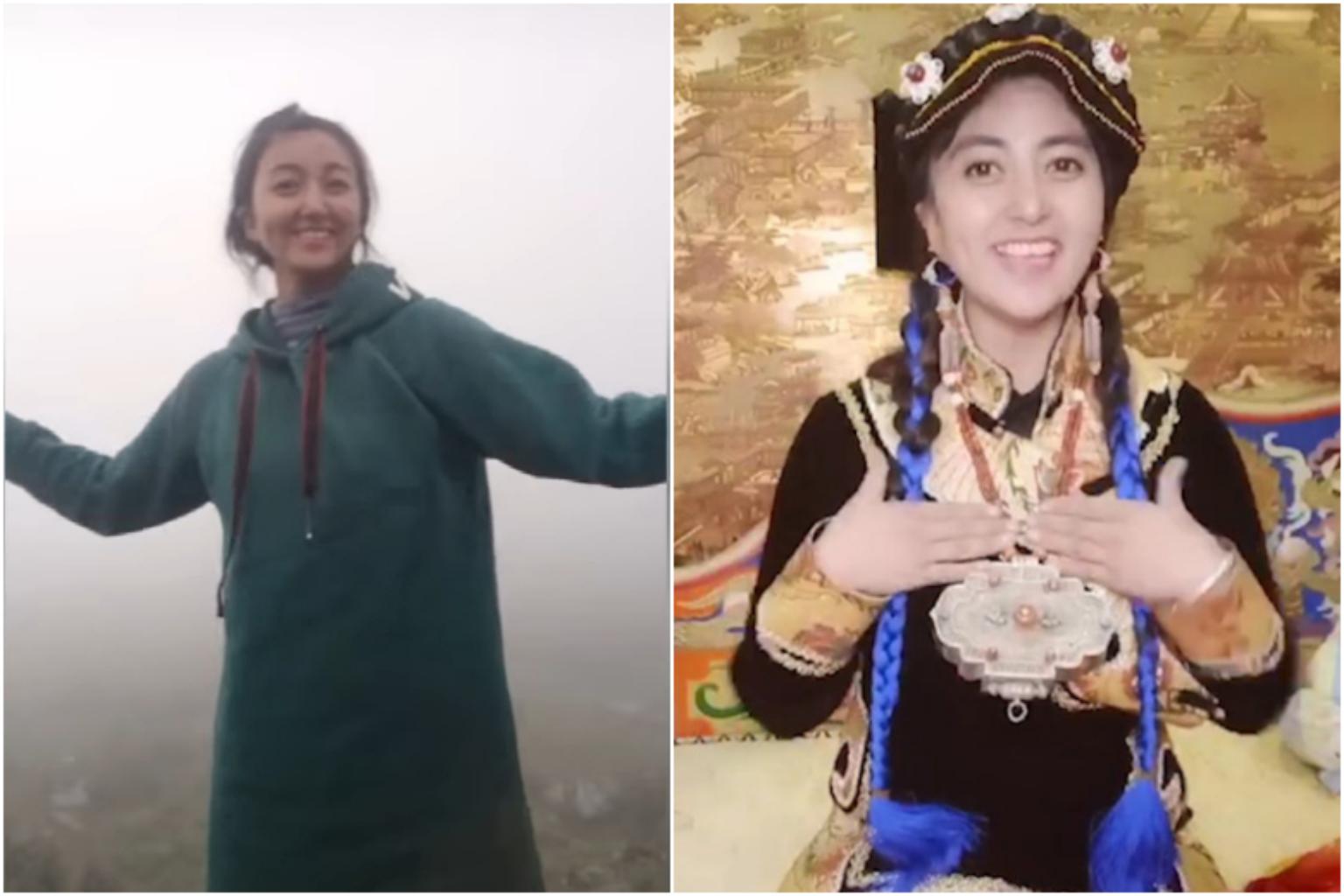
The tragic case of a rural live-streamer who died after being set alight by her former husband in her home saw an outpouring of anger and frustration over domestic violence in China.
Ms Lamu, 30, was live-streaming on Sept 14 in her kitchen when viewers heard her piercing screams and her screen went black.
She was later found with burns to 90 per cent of her body after she was doused in petrol and set on fire by her assailant, identified only by his surname Tang, who had broken into the house
Ms Lamu had hundreds of thousands of followers on Douyin - the Chinese version of TikTok - and regularly posted videos of her daily life foraging in the mountains, cooking and lipsyncing to songs while dressed in traditional Tibetan clothing.
Her fans raised one million yuan (S$201,000) for her hospital treatment shortly after the attack, local media said.
Millions of users on the Twitter-like platform Weibo demanded justice using the trending hashtags #Lamu case and #Lamu died after being set on fire by her ex-husband - which were later censored.
Her elder sister told reporters that Tang had been violently abusing Ms Lamu and even beat up her family. During an attack in May, Tang swung a stool at Ms Lamu and broke her right arm. Her family accused police of inaction despite their complaint of his violence.
Ms Lamu had sought a divorce before her death, which was granted by a court. Tang was awarded custody of both their children.
In September, police said Tang had been detained on suspicion of intentional homicide.
7. Thailand's deadliest mass shooting

Feb 8 was a Buddhist holiday in Thailand, with many looking forward to spending a relaxing time with their families. But the day unexpectedly turned ugly when a soldier went on a shooting rampage in the north-eastern city of Nakhon Ratchasima, killing 30 people and injuring 57 others in the country's worst mass shooting.
Sergeant Major Jakrapanth Thomma, 32, was meeting his commanding officer and the officer's mother-in-law to discuss a property deal that had gone sour when he opened fire, killing both of them.
He then drove to his army camp, a Buddhist temple and a shopping mall, gunning people down and chronicling the carnage in live Facebook updates. He was killed by security forces the next morning.
Most of the victims were at Terminal 21 shopping centre, where the shooter held out against an overnight siege with an assault rifle and ammunition stolen from his army base.
Hours before his shooting spree, Jakrapanth had posted on Facebook denouncing people who cheated others to become wealthy.
"Do they think they can spend the money in hell?" Jakrapanth asked.
The rogue soldier was upset that he was denied a pre-agreed commission over a land purchase that involved the senior officer and his mother-in-law, which brought attention to the business dealings of army personnel in a country that had just emerged from direct military rule.
The military has a long tradition of involvement in business and it has been an open secret that some officers branch out into private business deals.
In an emotional apology after the massacre, Thai army chief Apirat Kongsompong vowed to root out the practice.
8. Beheading of French teacher Samuel Paty
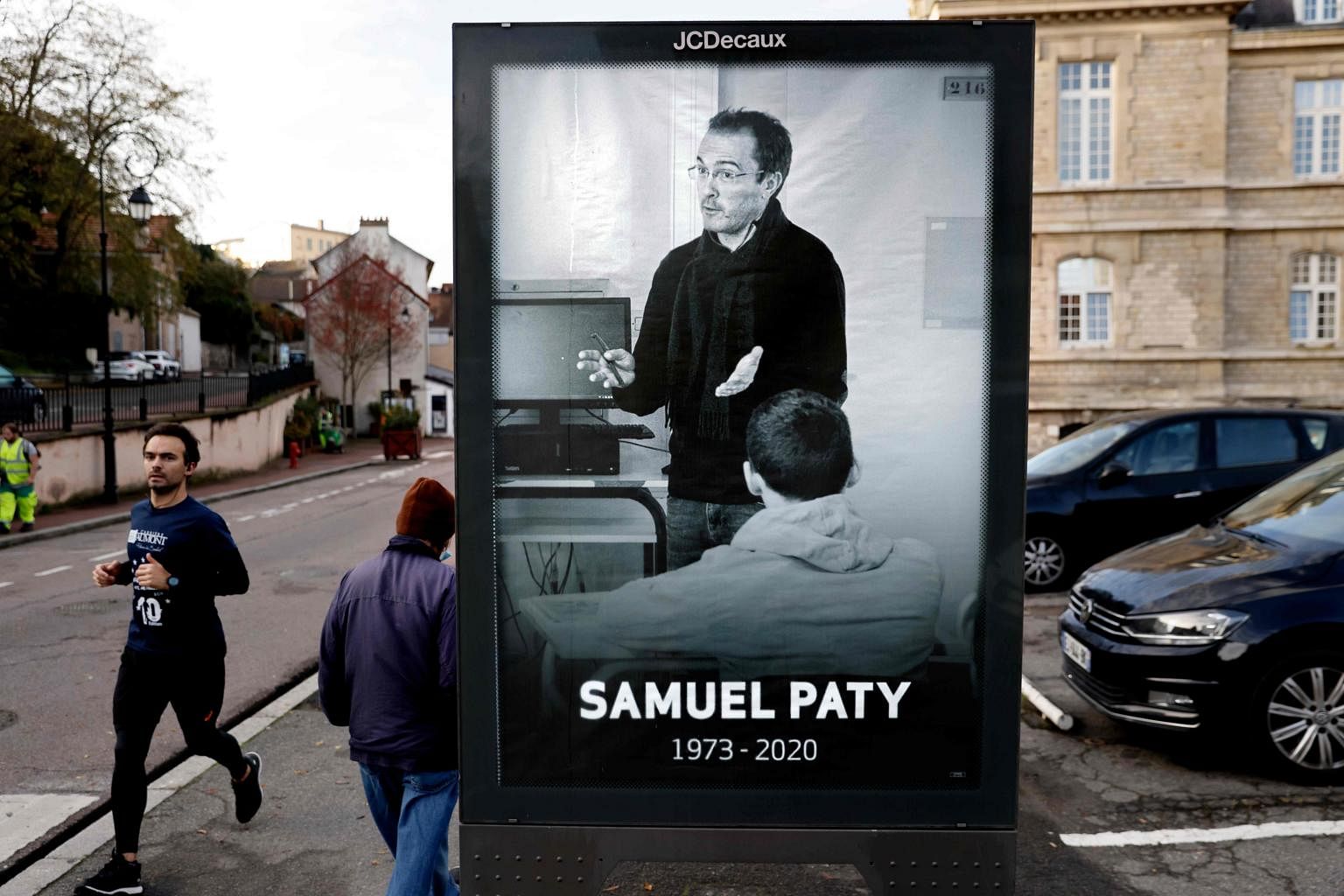
On Oct 16, an 18-year-old Chechen refugee approached two students outside a school in the French suburb of Conflans-Sainte-Honorine and paid them €300 (S$488) to point out Mr Samuel Paty, a teacher who had shown his pupils cartoons of the Prophet Mohammad in a civics class on freedom of expression.
When Mr Paty, 47, walked out of the high school two hours later, the refugee, Abdullakh Anzorov, tailed his victim with a 30cm-long knife. Abdullakh stabbed and beheaded Mr Paty on a street near the school shortly before he was shot dead by police.
Muslims believe that any depiction of the Prophet is blasphemous.
In an apparent defence of free speech during Mr Paty's memorial service, French President Emmanuel Macron landed himself at the centre of a global backlash, particularly in the Islamic world, when he said France would not "give up" the caricatures and pledged to tackle extreme Islamism in the country.
Protesters took to the streets in Bangladesh, Pakistan, Iraq, Gaza and Turkey as France warned its citizens abroad to take extra precautions.
Leaders in countries, such as Malaysia and Indonesia, decried Mr Macron's comments. Canadian Prime Minister Justin Trudeau said while he defended free speech, it was "not without limits" and should not "arbitrarily and needlessly hurt" certain communities.
By November, 10 people, including the 14-year-old and 15-year-old who pointed Mr Paty out to his killer, have been charged over his killing. Three of those charged were teenagers who were accused of "criminal terrorist conspiracy".
Mr Paty was posthumously awarded France's highest order of merit, the Legion d'Honneur.
9. Pakistan roadside gang rape
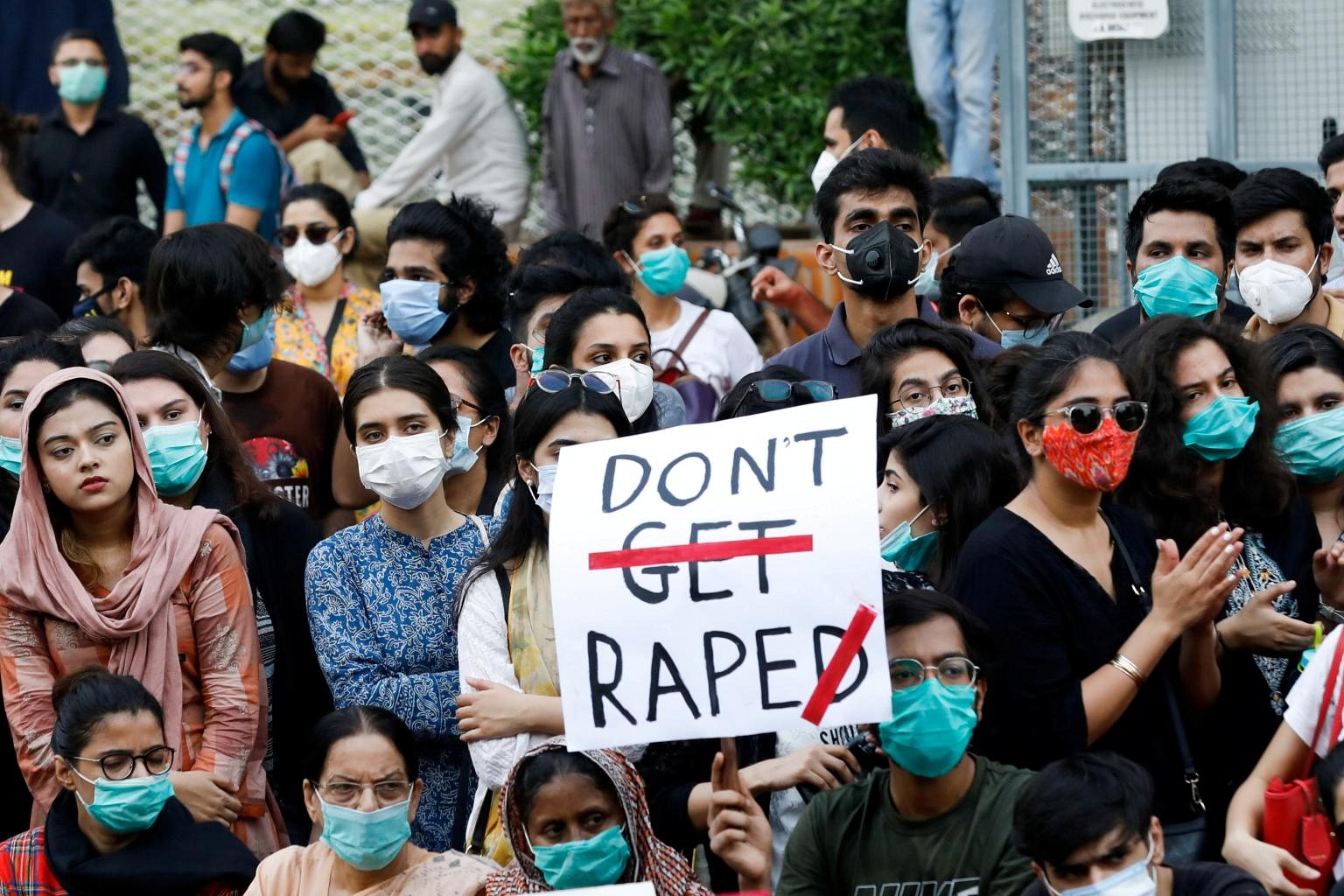
Protests erupted after a mother was waylaid and gang raped at gunpoint on the side of the road in front of her children when her car ran out of fuel near Lahore.
The road was reportedly unsafe for travelling, with no police patrolling, no service area, no petrol pump and no speed limit as drivers were free to drive as fast as they could.
According to police report, the woman parked her car on the motorway at 1.30am local time after it ran out of fuel on her way to Gujranwala from Lahore. She contacted a relative in Gujranwala and called police helpline. But motorway police refused to help her, saying the area did not fall within their jurisdiction.
As the family remained stuck on the road, two men approached the vehicle and smashed the windows, dragging the woman and her children out and raped her.
Lahore police chief Umar Sheikh received backlash after he repeatedly chided the victim for driving at night without a man, adding that no one in Pakistani society would "allow their sisters and daughters to travel alone so late".
Mr Sheikh went on to say the woman - a resident of France - probably "mistook that Pakistani society is just as safe" as her home country.
Human rights minister Shireen Mazari said his remarks were unacceptable, adding: "Nothing can ever rationalise the crime of rape."
The rape prompted Prime Minister Imran Khan to call for the chemical castration of rapists, which involves using drugs to reduce a person's libido, which subsequently formed part of sweeping new legislation approved by President Arif Alvi in December.
The legislation would also see rape cases expedited through the courts and create the country's first national sex offenders register.
At least two suspects have been arrested and they could face charges, including robbery, rape and terrorism charges that could carry a death sentence.
10. Vienna mass shooting
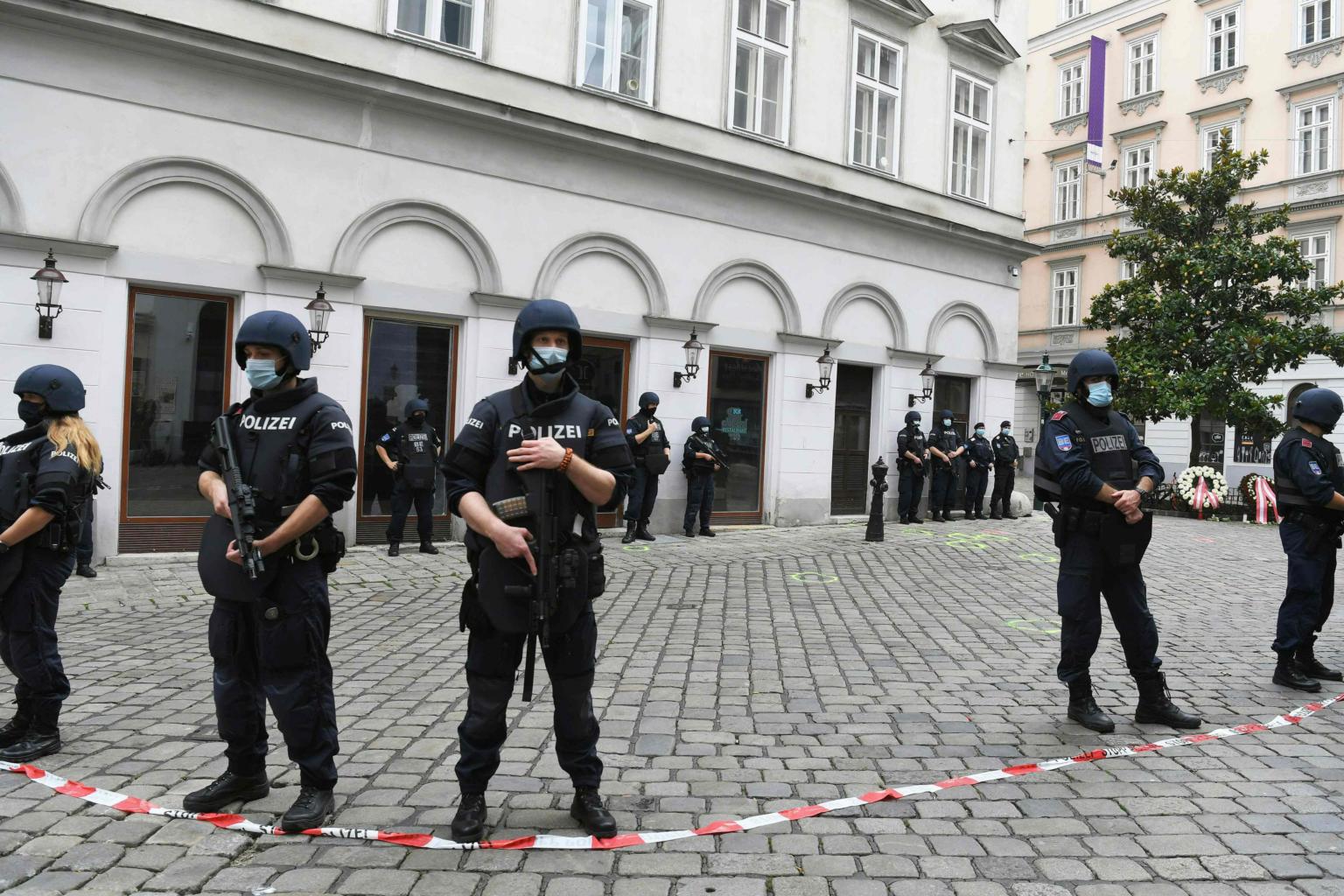
Dressed in a black shirt and cap, with an automatic rifle, a handgun and a machete in hand, 20-year-old Kujtim Fejzulai looked into the camera for the last photo he posted of himself on Instagram before setting off on a killing spree in Vienna.
On Nov 2, he killed four people and injured 22 in what was the deadliest attack in Austria's capital for decades, moving through Vienna's inner city and shooting at passers-by for nine minutes from about 8pm local time, until he was shot dead by police.
Witnesses to the attack had described crowds in bars being fired on with automatic rifles, as many people took advantage of a last evening out before the start of a nationwide coronavirus curfew.
Six locations were attacked in central Vienna, starting outside the main synagogue, which was closed.
The ISIS claimed responsibility for the attack.
The gunman, who had dual Austrian and North Macedonian citizenship, was born and raised in Vienna. He had already been convicted of trying to reach Syria to join the ISIS and had spent time in jail until his release in December 2019.
Interior Minister Karl Nehammer said Fejzulai had fooled the justice system's de-radicalisation programme to secure an early release.
In a televised speech to the nation, Austrian Chancellor Sebastian Kurz said: "This is not a struggle between Christians and Muslims, or between Austrians and migrants."
"It's a struggle between the many who believe in peace and the few who seek war. A struggle between civilisation and barbarism," he added.
Contributions from Raul Dancel, Wahyudi Soeriaatmadja, Chang May Choon, Reuters, AFP, Dawn/Asian News Network

